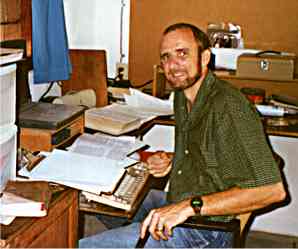|
If we are so foolish as to call ourselves "Bible
Translators", then we shouldn't be surprised that people tend to think that
we actually just sit down and translate just like you might, say, sit down and
work a crossword puzzle. Alas, it's a whole lot more complicated than that for a
number of reasons. Two reasons, to be precise.
First, no white person can or will ever learn to speak Kwong like a native.
This is no reflection on either the mental capacity of white people, nor on the
complexity of Kwong (which is not an exceptionally difficult language by world
standards). Rather, it is a reflection on the inherent complexity of any human
language. Human thought is unbelievably complex, and the language which it
spawns is correspondingly complex. So there you have it - no matter how well we
learn the language, we can never express it with all the breadth and richness of
a native speaker.
Second, while it would be going too far to say that a Kwong man or woman could
never learn to exegete a Biblical text, read commentaries in
English and French, struggle with the nuances of theology and Judeo/Greek
thought, and synthesize what he learns in such a way as to translate it, the
fact of the matter is that none have, and it is unlikely that any will.
So, the Kwong need us, and we are handicapped without them. Just the kind of
interdependence you might expect God to arrange so that none of us gets too
cocky. 
So here's how it works:
-
Exegesis
and Front Translation -Mark studies the passage to be translated,
consults commentaries and other reference works, and produces a French
version of the passage which expresses the meaning in terms that the
translators can understand. Mark tries to anticipate the problems which
might arise in Kwong and suggests key Kwong words where helpful.
-
Initial
Kwong Translation -
Using the French version Mark has produced, Laurent produces an
initial Kwong draft of the passage.
-
 Cross-examination - Laurent
reads the Kwong draft to Mark who follows along in other versions.
Mark critiques the translation and together they work out those places where
the translation is either unnatural, unclear, or departs from the meaning of
the original. Cross-examination - Laurent
reads the Kwong draft to Mark who follows along in other versions.
Mark critiques the translation and together they work out those places where
the translation is either unnatural, unclear, or departs from the meaning of
the original.
At this point we call it a "First Draft." Luke takes the
manuscript and types it, and then we usually use the translated passage in a
discipleship class where it gets its initial “road-test”.
-
1st
Field Test -
One or more people from the village who were not involved in the translation
are called in as "guinea pigs" to test the translation. Luke or Joseph reads
the draft translation out loud, while the "guinea pig" translates what he
hears into French. Mark follows along in other versions and then
cross-examines the guinea pig on what he understands from the passage as we
have translated it. It is very surprising what variety of serious
misunderstandings show up in this way. 
-
Recheck
Exegesis
- By
this time the initial draft has undergone so much revision, it is
questionable as to just how faithful the translation still is. Mark goes
over it all again with his commentaries and reference works to make sure we
haven’t wandered off into some fiction not in the original text nor inadvertently invented a new religion.
-
2nd
Field Test
- The
passage is once again tested with yet another "guinea pig" to make sure that
the changes introduced by the 1st testing or in the exegesis
check did not mess something else up.
-
Consultant
Check -
The final quality-control is performed by a consultant who is an experienced
Wycliffe translator. (The Swiss lady who presently checks our work has two New
Testaments to her name.) Most of the Bible Societies require such a check
before they’ll publish anything. It’s a bit complicated and pretty
tedious since the consultant doesn’t know Kwong, but over the years a very
effective system has been worked out which is similar to what we do for our
field testing.
-
Publishing
- Once the consultant gives his/her approval, we feel free to publish. For
Scripture portions, the final “textus receptus” is formatted, and sent
to the TEAM printshop in Moundou. We sell the material at about half cost
(and, incidentally, are always interested in having some money on hand
to cover the other half). When the time comes to print the whole Bible (or a
substantial part of it) we will doubtless work through one of the big Bible
Societies.
|


 Cross-examination
Cross-examination